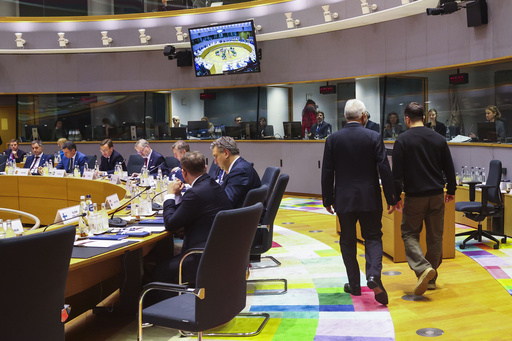
BRUSSELS — On Thursday, European Union leaders reiterated that any decisions regarding the future of Ukraine must include the country’s input and cannot be made without the involvement of its European partners. This declaration comes just weeks before the inauguration of U.S. President-elect Donald Trump.
Ukraine finds itself in a vulnerable position after more than 1,000 days of conflict. Despite significant losses, Russia continues to gain ground in the ongoing fight. The country’s energy infrastructure has suffered extensive damage, and the search for military personnel is proving difficult.
During a summit in Brussels attended by Ukrainian President Volodymyr Zelenskyy, EU leaders united in expressing a clear stance: nothing should be decided regarding Ukraine without the nation’s participation and no plans for European security should be established without the Europeans themselves.
Trump, set to take office on January 20, has expressed intentions to swiftly conclude the war in Ukraine and has boasted about his relationship with Russian President Vladimir Putin. This development has raised concerns among Europeans who fear it may lead to a setback for Ukraine.
There are also growing apprehensions that Putin might exploit the transition period to bolster his military capabilities and heighten tensions in the region. Speculation about potential peace negotiations in early 2025 has circulated throughout Europe, with discussions regarding the necessity of European peacekeepers to uphold any agreement. EU leaders are attempting to manage these rumors cautiously to avoid revealing their strategies to Russia.
As leaders focus on strengthening Ukraine’s position ahead of any possible negotiations, German Chancellor Olaf Scholz emphasized the importance of providing long-term support to Ukraine, asserting that the commitment to assist must be evident and unwavering. He outlined that military supplies such as air defense systems, artillery, and ammunition are critical components of this support.
Regarding Trump’s approach, Scholz mentioned that his conversations with the president-elect lead him to believe that a positive collaboration between Europe and the U.S. is achievable. He reaffirmed the principle that no decisions should be made without the approval of Ukraine’s leaders and expressed the need for inclusive dialogue involving European states.
Luxembourg’s Prime Minister, Luc Frieden, echoed this sentiment, underscoring the necessity of aligning EU actions with Ukraine’s needs, stating that Ukraine’s future will be determined within Europe itself.
Dutch Prime Minister Dick Schoof added that the conditions for negotiations are solely up to Ukraine to decide, making it clear that the current stance of the Ukrainian government does not reflect readiness for talks at this moment.
Zelenskyy emphasized the need for a unified front between the U.S. and the EU in the coming year, asserting that only through collaboration can they effectively counter Putin’s ambitions and safeguard Ukraine. He maintained that NATO membership remains the most viable security assurance for his nation.
When asked about discussions taking place with European leaders, Zelenskyy refrained from divulging specifics, declaring that no definitive conclusions have been reached, though he acknowledged a shared awareness of Putin’s threat.
The uncertain political landscape raises questions about Trump’s forthcoming actions, particularly given the history of his previous term. For instance, in 2020, the U.S. engaged in a military withdrawal agreement with the Taliban, sidelining the Afghan government’s concerns. This led to a disorganized exit in 2021, which tarnished the reputation of the U.S. and its NATO allies, as the Afghan forces they cultivated capitulated and lost control to the Taliban.
In supporting Ukraine, the EU has allocated substantial resources—over 180 billion euros (around $187 billion) since the onset of Russia’s invasion nearly three years ago—equivalent to or exceeding U.S. assistance. However, while the EU might sustain Ukraine’s fragile economy, it is unlikely to provide the necessary military resources for the nation’s armed forces to achieve a decisive victory in the conflict.
